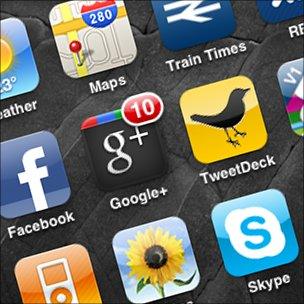Google+ opens its doors to all
- Published
- comments
Vivik Gundotra, Google's senior vice president of social business: "We think there's lots of room for innovation"
Last week, discussing the current state of the social networking landscape, I described Google+ as a "niche forum for the geek community."
Tonight the search giant is showing how determined is it to change that by throwing open the doors to all-comers.
And by introducing a raft of new features to its social network, it's throwing down the gauntlet not just to Facebook but to other media players.
Both Apple and Skype, for instance, might need to take a close look at the "mobile hangout" feature, which will allow Google+ users to have video chats with groups of friends. Could this be the way that video calls are finally made attractive to a mass audience?
And broadcasters may wonder whether Google is moving onto their turf with "Hangouts on Air". This looks to be a simple tool allowing anyone with a video podcast to broadcast it to the entire Google audience.
The company has recruited the rapper Will.iam to star in his very own public hangout and showcase this new medium.
'Feel the magic'
This afternoon I spoke to Vic Gundotra, the executive who has masterminded the development of the social network. It's not the company's first venture in this area but, just 12 weeks in, Mr Gundotra is entitled to feel cautiously optimistic that Google+ is going to make a bigger impact than its previous efforts.
And make no mistake, its success matters.

...but can it compete with more established social networks?
"It's a strategic initiative which touches every part of Google," he told me. "Whether you love YouTube, whether you love Google maps or use Android or iPhone, you'll see a much better experience."
Mr Gundotra repeatedly emphasised how much people loved Google products, and what an opportunity that provided for the company to engage with them in different ways.
I began to feel a little faint when he told me that Google+ was all about "what happens when you apply the magic of Google to the people who matter in your life".
Cutting through the Californian claptrap, I began to discern a message. Google has been brilliant at technology and making products that make you go "wow", much less good at understanding how people relate online. Or in Vic Gundotra's words, "the web is about more than pages, its about people".
But the big question is whether the 750 million people who currently use Facebook and the 100 million who are signed up to Twitter will decide they need to move - or need yet another social network in their lives.
When I look at my own activity on Google+ over the last few weeks, I can't make up my mind about the answer.
My experience is that when I do post something work-related, I get a lot of high-quality responses from the technology community. But then I look at the profiles of the family and friends I invited to join and find that their presence in Google's shiny new world ranges from sparse to non-existent.
But Facebook, preparing to announce yet more new features in the coming hours, does seem to view Google+ as a real threat.
So whether or not millions of people beyond the geek community choose to apply the "magic of Google" to their lives, the mere threat of competition is bringing a new wave of innovation to the social media industry